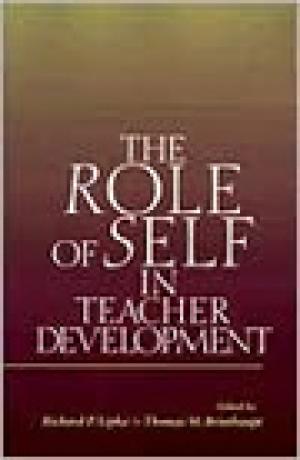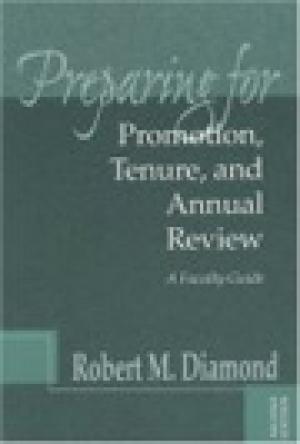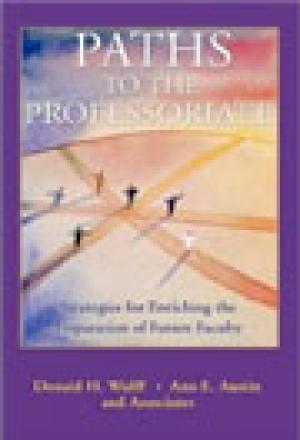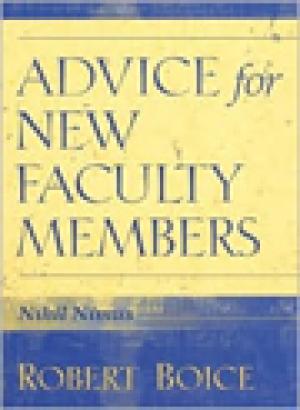Resources

The Role of Self in Teacher Development explores some of the major transition points in becoming a teacher and focuses explicitly on how issues of self and identity bear on these different points. The contributors examine not only pre-service teachers, but also the first years of teaching, the characteristics of the master teacher, and the processes of reexamining and affirming one's identity as a teacher. A recurrent theme throughout the book is the importance of balancing the personal development of teachers with their professional development. (From the Publisher)
Doctoral students in Bible, theology, ethics, history, preaching, worship, pastoral care, and Christian education come together for a required seminar in teaching. Assignments include reading and discussion, student-led teaching demonstrations, and the 'metaphorical mapping' of each student's field of study. In developing their 'metaphorical maps' students use artistic and expressive media to demonstrate their understanding of their field. The assignment has been successful in establishing an open and mutually respectful climate in the classroom, in fostering a pattern of critical reflection on teaching, and in demonstrating appropriate inclusion of personal experience in the academic classroom.
Over the years, thousands of students have left Africa to pursue theological doctorates in Christian institutions of higher learning around the world. The study reported in this paper endeavored to understand their experiences and articulate their needs and aspirations. Data were collected through semistructured interviews with 23 African students and were analyzed using grounded theory procedures. The emerging profile revealed African students in pursuit of theological doctorates to be mature in age and experience with rich and variegated backgrounds. While a desire for increased competence, access to employment opportunities, and a greater voice in church and society were motivating factors in their educational quests, the dominant motivation expressed by research participants was a passion to help Africa and the African church. Students viewed increased competence and access as enhancing usefulness. Consequently, students preferred doctoral programs perceived as Africa-relevant and internationally credible. Nevertheless, they demonstrated a readiness to compromise the ideal in favor of the achievable, particularly in terms of program affordability. (From the Publisher)

This practical, best-selling book has guided thousands of faculty through the promotion and tenure process since its publication in 1995. This new edition has been significantly revised and expanded, but has also kept its focus on process—what faculty can do to make a better case for why they should be promoted or tenured. This new edition of Preparing for Promotion, Tenure, and Annual Review contains a number of additional resources not included in the previous version—materials that are designed to help faculty prepare for a major professional review—such as post-tenure review, teaching with technology, dealing with changing guidelines and policies, and suggestions on how annual review materials can be used as a foundation for the promotion and tenure portfolio. In addition to updated references and resources, there are also expanded sections on scholarship, on teaching and on advising, on how to best document faculty role and impact as part of a team, and on collegiality. (From the Publisher)

It has been estimated that in the next ten years, about half of the current higher education faculty will retire. How can we best prepare the next generation of faculty members to fill this tremendous gap in our educational system? Paths to the Professoriate offers all those involved in higher education—everyone from administrators to scholars to graduate students—a much-needed resource that brings together major research, the most important developments in practice, and informed analysis on improving graduate education and preparing the future faculty. This important book includes chapters from some of the best-known researchers, practitioners, and scholars working to prepare the faculty of the future. In one volume, the authors offer a synthesis of what has been learned about the challenges and concerns in graduate education as preparation for faculty careers, highlight the various projects and approaches for improving graduate education, and identify strategies for institutional leaders, department chairs, faculty advisors, and graduate students. Paths to the Professoriate: * Presents important reasons for considering ways to improve the preparation of the next generation of faculty * Describes research studies concerning the graduate school experience * Highlights illustrative examples of innovative programs and projects * Provides a synthesis of key lessons from the research and projects addressing the preparation of future faculty This solidly research-based book covers such vital topics as: the lack of systematic developmentally organized preparation for those aspiring to teaching careers in higher education; graduate students’ perceptions of their graduate experiences and their preparation for faculty work; particular challenges confronting Black doctoral students; reasons students leave doctoral study; programs to prepare graduate students for roles as teaching scholars and engaged citizens; strategies to help graduate students and faculty members identify mutual goals and resolve conflicts; and much more. Paths to the Professoriate offers all those concerned with the fate of higher education a valuable resource for the future. (From the Publisher)

While graduate assistants are valued as labour savers, they are also a precious resource whose preprofessional training needs careful design. Written by two leading authorities in the field of instructional development, this indispensable guide details the skills necessary for academics dealing with graduate assistants. The authors provide comprehensive coverage of all aspects of assistant preparation and assessment, and a chapter addressing special needs of international graduate assistants is included. (From the Publisher)

Maybe you'd like to combine the two loves of your life, teaching and scholarship, and perhaps build a satisfying and profitable academic career, but you're not sure if this is really what you want or how to go about it. Or maybe you've made up your mind but need some good advice on how to succeed. If so, this book is written for you. So You Want To Be a Professor begins with a discussion of jobs in academia and how to find them. Chapters cover a wide range of political skills for future academic success, including lecturing, organizing a course, meeting your first class, testing, maintaining a research program, and writing for publication. No other book provides such a practical overview of essential career-building skills. Even junior faculty will benefit from the advice in this engaging, comprehensive book. (From the Publisher)

Nihil Nimus is a unique and essential guide to the start of a successful academic career. As its title suggests (nothing in excess), it advocates moderation in ways of working, based on the single-most reliable difference between new faculty who thrive and those who struggle. By following its practical, easy-to-use rules, novice faculty can learn to teach with the highest levels of student approval, involvement, and comprehension, with only modest preparation times and a greater reliance on spontaneity and student participation. Similarly, new faculty can use its rule-based practices to write with ease, increasing productivity, creativity, and publishability through brief, daily sessions of focused and relaxed work. And they can socialize more successfully by learning about often-misunderstood aspects of academic culture, including mentoring. Each rule in Advice for New Faculty Members has been tested on hundreds of new faculty and proven effective over the long run -- even in attaining permanent appointment. It is the first guidebook to move beyond anecdotes and surmises for its directives, based on the author's extensive experience and solid research in the areas of staff and faculty development. For new teachers. (From the Publisher)